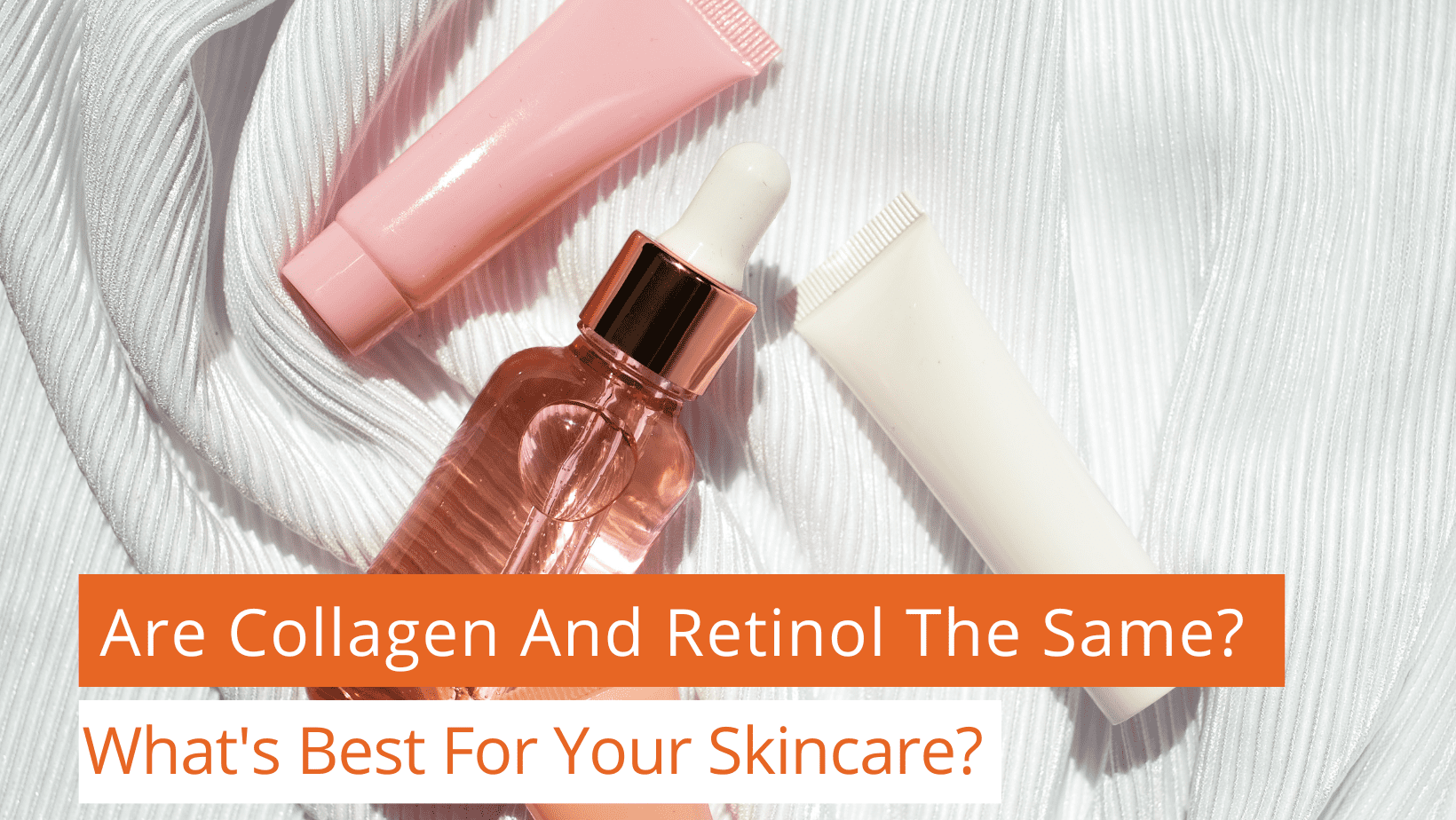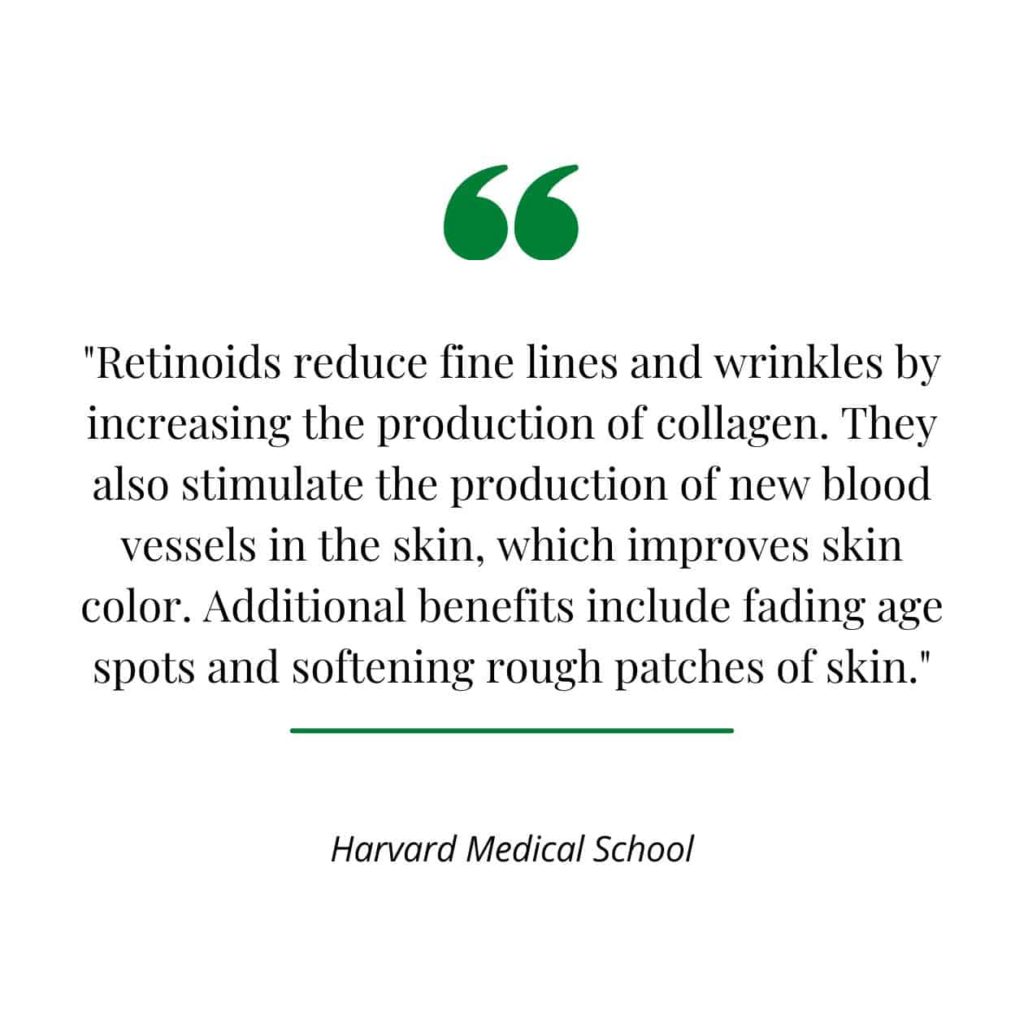Are Retinol And Collagen The Same? What’s Best For Your Skincare?
“Good skin care is essential at any age and healthy habits in your 20s and 30s can strengthen and prepare your skin for the effects of aging down the road.”
Northwestern Medicine
Looking to up your skincare routine? There’s many products that claim to give you the boost you need for healthy, glowing, youthful skin. But which is best? You hear terms like “retinol” and “collagen” and “hyaluronic acid” but what does it all mean?
Retinol is a form of vitamin A that is found in skincare products. It’s often used to reduce the appearance of wrinkles and improve skin texture. Collagen is a type of protein that is responsible for the structural support of skin, hair, nails, and other connective tissues. Collagen production declines with age, which can lead to visible signs of aging.
In this article, we’ll explore the question, “are retinol and collagen the same?” and give you a look at some of the key differences between the two.
What is Collagen?

Image Source: Collagen for Your Skin: Healthy or Hype?
Collagen is a protein found in the connective tissues of our bodies, including the skin, tendons, and ligaments. It’s responsible for giving these tissues their strength and elasticity. As we age, our bodies produce less collagen, leading to wrinkles and a loss of firmness in the skin.
There are many ways to keep your collagen production up as you age. One is to eat foods that are rich in collagen, such as bone broth or chicken soup. You can also take supplements that contain collagen peptides or hydrolyzed collagen. These can help to replenish your body’s supply of this important protein.
Collagen protein is important for maintaining healthy connective tissue, preventing wrinkles, and improving joint function. So if you’re looking for ways to stay young and healthy, make sure to include collagen in your diet!
Why Do We Need Collagen?
Without collagen, our bodies would be looking a little sad. Our skin would be dry, thin, and prone to tearing, our hair would be dull and lifeless, and our nails brittle and frail. In addition to its anti-aging benefits, collagen also helps to improve joint health, reduce inflammation, and promote healing.
Research has shown that collagen supplements or using a collagen serum can help to improve joint pain and stiffness, making it an effective treatment for conditions like osteoarthritis.
The Types of Collagen

Image Source: Hydrolyzed Collagen—Sources and Applications
Did you know that there are actually 28 different types of collagen? It’s true! That being said, there are just a few that play the most vital roles in the human body.
Types I, II, and III are the most common and they can be found in various connective tissues, including skin, tendons, and ligaments. Type IV is found in bones and Type V is found in blood vessels.
While we generally think of collagen as being good for youthful skin and helping to keep us looking young, it also plays an important role in keeping our bones strong and our joints healthy.
What is Retinol?
Retinol is a nutrient found in animal foods and supplements. It’s also known as vitamin A1. Retinol is important for vision, bone growth, reproduction, and cell division. Your body can’t make retinol, so you need to get it from your diet. Good sources of retinol include liver, kidney, eggs, and dairy products. It’s also added to some cosmetics, including eye makeup and lotions
Retinol is converted to the retinal in your body. Retinal is then converted to retinoic acid, which is important for vision and maintaining healthy skin. Retinoic acid is also used to treat acne and wrinkles. When applied to the skin, retinoic acid can help to reduce the appearance of fine lines and wrinkles. It can also help to fade age spots and improve the texture of rough skin.
Why Do We Need Retinol?

Image Source: Do retinoids really reduce wrinkles?
Although many people believe that retinoids are only effective against wrinkles, they actually offer a host of benefits for the skin. In addition to diminishing the appearance of fine lines and wrinkles, retinoids can also improve the overall tone and texture of the skin. They can help to diminish the appearance of dark spots, reduce inflammation, and even out the skin’s surface.
Retinoids are also one of the few anti-aging ingredients that have been proven to be effective in clinical trials. So, if you’re looking for an anti-aging treatment that offers real results, retinoids are definitely worth considering. You can add it to your skincare routine by buying a retinol cream or other great products.
The Types of Retinol
There are three main types of retinol: retinyl palmitate, retinoic acid, and retinaldehyde. Retinyl palmitate is the least potent form of retinol and is often used in skincare products aimed at preventing wrinkles. Retinoic acid is a stronger retinol that is only available with a prescription. It can be used to treat acne or wrinkles, but can also cause side effects like dryness, redness, and peeling. Retinaldehyde is the weakest form of retinol and is often used in over-the-counter anti-aging products.
If you’re interested in using a retinol product, it’s important to talk to your dermatologist first to determine which type of retinol would be best for your skin type.
Which is Better: Collagen or Retinol?
Both collagen and retinol are two important nutrients that our bodies need to function properly. While they share some similarities, there are also some key differences between the two.
Let’s take a look at some of the differences between collagen and retinol:
Effects
Collagen is responsible for keeping our skin looking young and healthy. It also helps to keep our bones strong and our joints healthy. Retinol is important for vision, bone growth, reproduction, and cell division.
Formation
Collagen is made by cells called fibroblasts, and it’s a combination of proline, lysine, sugars, and hydroxyl groups bonded together. While collagen is an important structural protein, it’s also responsible for keeping our skin healthy and youthful-looking.
Retinol is another important molecule for maintaining healthy skin. It’s achieved using provitamin A molecules taken with food or through vitamin supplements. retinol is found in many fruits and vegetables, such as carrots, sweet potatoes, and spinach. Like collagen, retinol helps to keep our skin healthy and looking its best. However, retinol also has other important functions, such as helping to improve vision and regulating cell growth.
Can I Use Retinol and Collagen Together?

Image Source: The Impact of Routine Skin Care on the Quality of Life
As we age, our skin changes. We start to see wrinkles, and our skin becomes less elastic. To help combat these visible signs of aging, many people turn to topical treatments like retinol and collagen. But can you use these two products together?
The short answer is yes, you can use retinol and collagen together. However, it’s important to be aware of how each product affects your skin. Retinol is a powerful ingredient that can cause irritation, redness, and flaking. If you have sensitive skin, it’s best to use retinol sparingly at first, gradually increasing frequency as your skin becomes accustomed to the ingredient.
Collagen, on the other hand, is a protein that occurs naturally in our bodies. As we age, our bodies produce less collagen, leading to wrinkles and sagging skin. Applying collagen topically can help to plump up the skin and reduce the appearance of fine lines.
When used together, retinol and collagen can be a powerful anti-aging duo. Just be sure to start slowly and listen to your skin’s needs. If you experience any irritation, redness, or flaking, reducing frequency or taking a break from treatment altogether may be necessary.
What About Hyaluronic Acid?
You may have seen hyaluronic acid in the ingredient list of your favorite skincare products, but what exactly is it? Hyaluronic acid is a type of sugar molecule that naturally occurs in the human body. It’s found in high concentrations in the skin, where it helps to keep the tissue hydrated and plump.
On top of overall skin health, hyaluronic acid plays an important role in wound healing and tissue repair. When applied topically, hyaluronic acid can help to reduce the appearance of fine lines and wrinkles by providing long-lasting hydration. It can also be used to treat other skin concerns such as dryness, redness, and irritation.
So, which one should you use: collagen, retinol, or hyaluronic acid? If you’re concerned about fine lines and wrinkles, collagen and retinol are both good choices. For dull, dry skin, hyaluronic acid can help to give you a radiant complexion. And if you’re looking for an all-in-one solution, there are now products on the market that combine all three of these ingredients. Whichever route you choose, you’re sure to see some improvements in your skin!
The Final Say: What’s Best?
There is no easy answer when it comes to what’s best: collagen or retinol. Both have their own set of benefits that can help improve the overall appearance of your skin. Depending on what you’re looking to improve–maintaining a healthy skin glow, livening up your hair and nails, or improving your eyesight–both have their advantages.
The best way to determine which is right for you is to experiment with both and see what works best for your individual skin type. If you have sensitive skin, start slowly with retinol and increase frequency as your skin becomes more tolerant. For dry skin, maybe try something that has hyaluronic acid. And if fine lines are your main concern, collagen is a good place to start.
At the end of the day, it’s important to remember that both collagen and retinol are important for keeping our skin looking its best. And if that still isn’t enough info for you, check out these other great Health Blogs for clarity on collagen, vitamins, supplements, and more! If you’re ready to dive in and start improving your skin, shop through some of the top, clean-sourced collagen products here!
Organixx Clean Sourced Collagens blend contains five types of collagen from four sources. What’s more, it’s combined with targeted nutrients such as zinc, vitamin C, and vitamin B6 which specifically enhance the bioavailability and potency of collagen. Clean Sourced Collagens is formulated from the ground up to enhance and support your body’s natural ability to heal and rebuild itself from the INSIDE out.








Comments